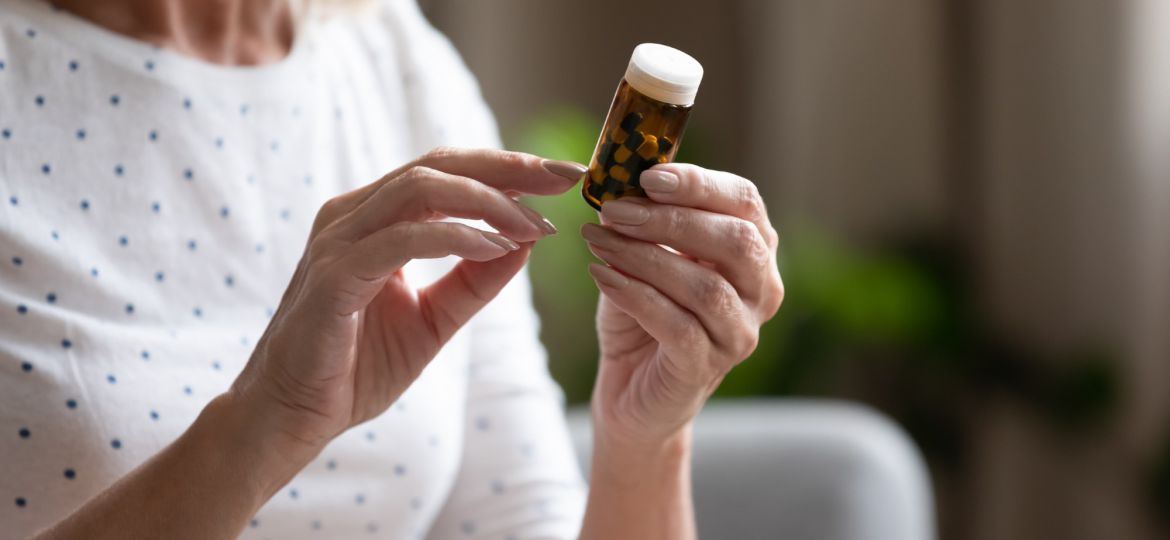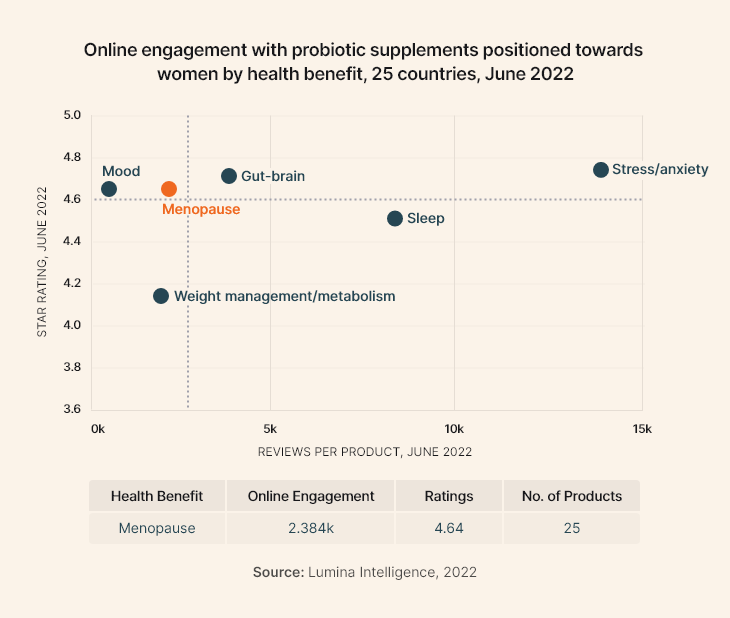
In the general dietary supplements space, talk of supplements to support women’s health during the menopause can conjure up thoughts of botanicals like Black Cohosh (Actaea racemosa) or the weakly estrogenic soy isoflavones to help manage hot flashes and other symptoms. But many probiotic insiders are seeing potential for microbiome modulation to shake up the space.
Symptoms of the menopause, which can affect between 70 and 80% of all menopausal women [1], include hot flashes, night sweats, sleep disturbances, mood disorders, and more. Recent studies indicate that the hormonal changes that occur during the menopause are associated with changes in the gut microbiota.
A 2019 paper by scientists from the University of Chinese Academy of Sciences in Beijing revealed significant differences in the microbiota of pre- and post-menopausal women. Specifically, the toluene-producing genus Tolumonas is overrepresented post menopause, and that’s not good [2].
The data also supported observations from elsewhere that perimenopausal women have a higher abundance of Bacteroidetes and Roseburia spp., while the abundance of Firmicutes and Parabacteroides is lower in these women. The Bacteroidetes data point is noteworthy because these bacteria are known to secrete a specific enzyme called β-glucuronidase that covert estrogens to their active forms. Women are also naturally producing less estrogen in their reproductive organs during the menopause, so this represents a double impact on hormone levels.
“The gut microbiome may be a therapeutic target to reduce risks and improve the quality of life in postmenopausal women,” they wrote.
And it appears that players in the microbiome modulation space are aware of the opportunity.
Indeed, in an interview with NutraIngredients-USA at SupplySide West 2022, a representative for Kaneka Probiotics describing menopause as “the next big issue”. [3]
The market
It’s all very early days for this emergent category, with data from Lumina Intelligence (June 2022) revealing 25 products specifically positioned for menopausal women across all the geographical markets that Lumina tracks [4].
Whilst the category is still niche, the first half of 2022 saw a sharp rise of consumer engagement with new reviews up by 136% to reach 48 thousand. Within probiotic supplements for women, products mentioning menopause are rated above average (4.64 stars out of 5), expressing a relatively high level of the initial product satisfaction, a key indicator for future growth prospects.
Provitalize by Better Body Co is one of most engaging products on the market having gained 15 thousand online reviews in the first half of 2022 alone. Whilst there is no reference to the menopause on pack, the product carries explicit claims on its product page on Amazon.com and Amazon.com.au “Original Provitalize – Natural Menopause Probiotics for Hot Flashes, Night Sweats, Low Energy, Mood Swings, Gut Health. Unique Probiotics Formula”., helping to raise the very initial consumer awareness of the potential link between gut health and menopause.
Probiotic supplements with a reference to pre/peri-menopause are at the entry stage in Canada, where New Chapter’s Women’s Daily Probiotic paves the way. Whilst there is again no reference to menopause on pack, its product description on Amazon.ca clearly states “…used in herbal medicine to help relieve symptoms associated with menopause, such as hot flushes”. Consumer engagement with the product has not taken off yet the big way (41 reviews, June 2022).
And it’s not just about managing the symptoms of the menopause, but also offering benefits for the range of other changes associated with the menopause, from bone and cardiovascular health to vaginal health, weight management, and cognitive function.
Reviewing the products on the market shows that many are formulated with combinations of probiotics with herbs and other ingredients. For example, the UK-based Health & Her, a brand that is exclusively positioned for peri-menopausal and menopausal women, offers a product called Menopause Biome formulated with five probiotic strains, plus vitamins A, D3, and K2 for immune, vaginal, and bone health, and cranberry extract. The company’s Perimenopause Biome is formulated with Ashwagandha.
In the US, there are already probiotic products on the markets with brands names such as HUM’s FAN CLUB multi-symptom menopause support, formulated with L. plantarum DR7 plus Siberian rhubarb extract and grape seed extract.
Arizona-based MenoLabs have taken the kitchen sink approach for their MenoFit and MenoGlow products, with a blend of four probiotics strains, a prebiotic blend, plus multiple vitamins and minerals, and a blend of eight herbs.
The gut-brain axis
The link between menopausal related hormone changes and gut bacteria is also opening new avenues for psychobiotics.
To support these links, researchers at Arizona State University reported in 2022 that changing hormone levels affected the bacteria in the gut, resulting in metabolic changes and also changes to brain function via the gut-brain axis.
“I believe this work has opened the door to many exciting future discoveries about the role of menopause and gut microbiota in impacting the brain and body during aging,” stated Stephanie Koebele, a postdoctoral researcher at the ASU Center for Evolution and Medicine [5].
There are already published clinical trials supporting probiotic or postbiotic interventions, such as a trial by scientists from Japan’s Asahi Quality & Innovations, Ltd using inactivated Lactobacillus gasseri CP2305. The study involved 80 middle-aged women and found that the postbiotic led to improvements in a range of scores, including sleep and vasomotor scores [6].
Data from an Iranian triple-blind randomized controlled trial using yogurts formulated with Bifidobacterium lactis and Lactobacillus acidophilus (the researchers do not disclose the specific strains). Six weeks of supplementation was associated with significant improvements in measures of anxiety, stress and quality of life in the postmenopausal women [7].
Outlook
The market is still niche, but when you consider that a woman essentially spends a third of their lives in a menopausal state, the potential size of the prize is evident.
Obviously more research is needed, with scientific support of efficacy from large cohorts and extended durations, but, as stated by Lumina, “the fact that such a large global target audience potentially stands to benefit from these investigations will be the driving force behind future advances.”
References
[1] Liu, et al. BMC Women’s Health 22, 437 (2022), doi: 10.1186/s12905-022-02029-w
[2] Zhao et al. FEBS Letters, 593 (18), 2655 (2019), doi: 10.1002/1873-3468.13527
[3] Masterson, D. 9 January 2023, ““Kaneka Probiotics takes on precision probiotics”
[4] Hudson, E. July 2022, “Probiotics to emerge as the first port of call for a smooth menopausal transition and beyond”
[5] ASU News, Hormone and gut bacteria link may guide better treatment for menopause symptoms, 28 February 2022.
[6] Sawada et al Nutrients. 14(9):1695 (2022). doi: 10.3390/nu14091695
[7] Shafie et al. Clinical Nutrition ESPEN, 50, 15, doi: 10.1016/j.clnesp.2022.06.005
Uncovering White Spaces – Probiotics For A Smooth Menopause Transition
In this report, Lumina Intelligence reviews the shifting perceptions of menopause, overviews some of the recent science studies and zooms in on the current offering within this niche.


